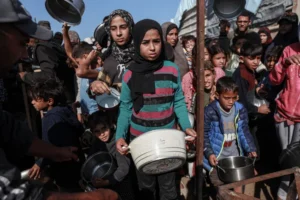‘Entire days without food’

Children wait to collect food at a community kitchen
Maram Humaid reports in Al Jazeera on 11 Dec 2024:
Ghada al-Kafarna stood in line outside the community kitchen in central Gaza as she does every day. It was 11am and the mother of 10 had been there for the past two hours. For me, securing food and bread is a constant battle,” the 41-year-old explained as hundreds of children, women and men jostled around her.
Ghada has no source of income and her husband suffers from a chronic illness that prevented him from working even before the war. Now the family, which was displaced from their home in Beit Hanoon in the north, lives in an UNRWA school turned shelter in Deir el-Balah and relies on tekkiyyat, community or charity kitchens distributing free meals. “When the tekkiyyat stop, I have no choice but to beg neighbours for food,” she said.
Ghada is exhausted. “My children haven’t eaten anything today. For the past four days, the charity kitchens have been closed because of the difficult situation, and my children have gone to bed hungry every night,” she explained tearfully. “I ask people around me and beg them every day for help.”
But most people are in the same position as Ghada and are unable to offer her family any assistance.
In October 2023, when Israel began its war on Gaza, it announced a “total” blockade on essential supplies to the Strip. In the more than 14 months since, Israel has restricted 83 percent of the food aid entering Gaza, according to the United Nations.
